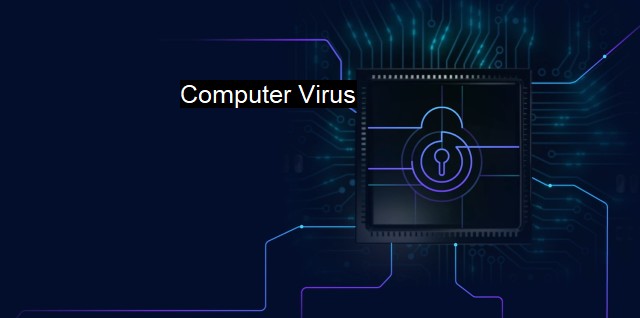What are Computer Virus?
The Importance of Cybersecurity: Fighting Dangerous Viruses in the Age of Technology
A "Computer Virus" is fundamentally a malicious software program or "malware" that, once it infiltrates a computer, interferes with the device's regular operations, corrupts, either deletes or modifies data, slows down system processes, and usually propagates and replicates itself to other computers on the linked network. These viruses are versatile and can infiltrate a computer system unattended via a simple download, email attachments, or a sneak through networked computers, masked as legitimate software.Computer viruses are software code specifically programmed to perform actions without the user's consent or knowledge. They are covert, destructive, and designed primarily to execute harmful activities. Just as with biological viruses, computer viruses can spread rapidly and widely, with the potential to cause considerable damage to valuable files in a computer system. A computer virus embeds into other executable programs where it can replicate and distribute itself, compromising the system and any network that the system is connected to.
Viruses employ several schemes to infect Host systems, the most prevalent of which are file infectors, system or boot-record infectors, and macro viruses. File-infecting viruses are triggered when an infected file is executed, thus running the destructive code. System or boot-record infectors, as the name suggests, target the system sector and the boot record of the device's hard disk, making the computer unusable. Macro viruses mostly target the macro language in applications and can quickly spread through documents within the system.
Computer Viruses come in many forms and are usually executed according to specific programmer instructions. For instance, the Trojan horse appears to users as useful software but instead allows unauthorized access to user systems or networks. Then there is the Worm, a standalone program that can reproduce itself and consume system resources— these are but a few of the forms computer viruses take.
The threat of computer viruses has led to the advent of cybersecurity protocols and deployment of powerful antivirus software. Understanding the intricacies of computer viruses equips individuals and organizations in their quest to secure their data and system integrity.
Antivirus, by definition, is a class of programs developed explicitly to secure computers from virus threats, including other forms of malware like Trojans, Spyware, adware, keyloggers, among others. They work by scanning, identifying, and eliminating computer viruses before they corrupt or even delete files on your computer.
Antivirus software has become quintessential for every computer user. It serves as the custodian of computer systems, always attentive, conducting regular scans, safeguarding files and software, inspecting web pages for potential security threats and attacks, and interposing firewalls to deter unauthorized access.
Cybersecurity refers to the protection of internet-connected systems, applications, and networks from digital threats. Rapid digitalization has led us to employ the use of computers in almost every sector, hence the vital need for reliable cybersecurity.
Cybersecurity practice uses technological measures to protect systems and sensitive information from cyber threats to uphold confidentiality, integrity, and accessibility. A robust cybersecurity measure is dynamic, immersive, and predictive, as the nature of cyber threats is continuously evolving. Cybersecurity's focus areas compass network security, application security, information security, operational security, and disaster recovery, each repelling a specific set of potential threats.
a computer virus is a malicious program that when activated, can damage files and software programs, slow down operations, and replicate itself, continuously wrecking havoc within an information system. Antivirus and cybersecurity, on the other hand, are protective mechanisms installed to keep computers, files and information safe from such threats. As we embark on a more digitized future, it becomes incredibly crucial that effective antivirus software and cybersecurity measures are developed, installed, and updated regularly for the optimized defense against computer viruses and other cyber threats.

Computer Virus FAQs
What is a computer virus?
A computer virus is a type of malicious software that is designed to alter, damage, or destroy computer programs and data. It can spread from one computer to another through email, file sharing, or other means.How does a computer virus infect my system?
Computer viruses can infect your system in a number of ways, such as through email attachments, infected programs, or by visiting a website that is infected with malware. They can also spread through networks and USB drives.What can I do to protect my computer from viruses?
To protect your computer from viruses, it's important to use an antivirus program and keep it updated regularly. You should also avoid opening suspicious emails or downloading unknown software. It's also a good idea to keep your operating system and other software up to date with the latest security patches.What should I do if my computer is infected with a virus?
If your computer is infected with a virus, you should disconnect it from the internet and run a virus scan with your antivirus program. If the virus cannot be removed, you may need to reinstall your operating system or seek professional help. It's also important to change any passwords that may have been compromised.| | A | | | B | | | C | | | D | | | E | | | F | | | G | | | H | | | I | | | J | | | K | | | L | | | M | |
| | N | | | O | | | P | | | Q | | | R | | | S | | | T | | | U | | | V | | | W | | | X | | | Y | | | Z | |
| | 1 | | | 2 | | | 3 | | | 4 | | | 7 | | | 8 | | |||||||